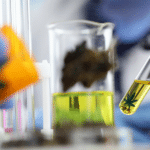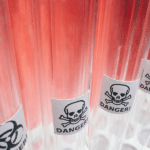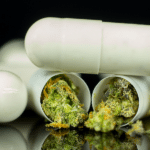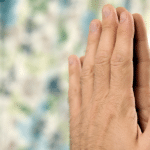Many of our patients have called in asking about cannabinoid hyperemesis syndrome (CHS), as this syndrome has been reported in the media numerous times over the past few months. This is a very rare syndrome that occurs in long-term heavy users of THC-rich cannabis. CHS was first reported in the medical literature in 2004. Symptoms include nausea, vomiting, and abdominal pain.
CHS occurs episodically or cyclically, meaning that the symptoms occur, then resolve, then come back again and so on, over and over. More than 90% of cannabis users who experience these symptoms also have a compulsion to bathe in hot water during the episode, reporting that it alleviates the discomfort. This compulsion is often what helps doctors and patients figure out that CHS is what’s happening as it is often confused with other diagnoses such as stomach flu, inflammation of the gallbladder, and appendicitis – where there is no compulsion to bathe in hot water.
People suffering from CHS will seek help at the ER and because they are reluctant to tell the doctor about their cannabis use, they go undiagnosed. Abstinence from THC-rich cannabis resolves the condition. Some CHS sufferers are able to re-introduce THC in very low doses without a return of symptoms, but others find that they can no longer tolerate THC.
It is unknown why some cannabis users experience this syndrome. It has been theorized that overuse of THC can make some people’s cannabinoid receptors act paradoxically (opposite) of how they are supposed to act. For example, we know that THC is quite effective for stopping nausea and vomiting because THC binds to the receptors on cells located in the part of the brain that control these symptoms. Once THC binds to the receptor, a chemical reaction takes place, telling the cells to stop sending the nausea/vomiting message. But in CHS, THC causes the opposite effect, increasing nausea and vomiting.
It’s likely that some people are predisposed to this paradoxical reaction because only a very small percentage of people who overuse THC get this syndrome.
Medical cannabis patients usually figure out that overuse of THC-rich cannabis is not effective in treating their medical conditions, as tolerance develops if too much THC is used. Tolerance can lead to loss of therapeutic effects. Low doses used intermittently work quite well for most. Daily users of low dose THC are unlikely to develop CHS.
Including CBD, and/or the raw unheated cannabinoids (THCA and CBDA), in a cannabis treatment regimen is likely to increase the effectiveness and decrease risk of any unwanted side effects, including CHS.
In my experience, medical cannabis patients that are thoughtful in their use of THC-rich medicine are at very low risk for developing CHS. I have seen only two cases of CHS in the last decade of practice. That being said, CHS is quite easy to avoid if you are thoughtful about your use of THC and make sure to not over do it.
Dr. Bonni Goldstein, a Los Angeles-based physician, is the author of Cannabis Is Medicine and the medical director of Canna-Centers, which offers educational seminars and webinars on cannabis therapeutics. © Copyright, Project CBD. May not be reprinted without permission.







